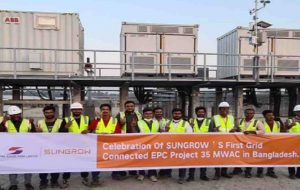After failing to elicit sufficient response from the international oil companies (IOCs) for deep sea gas exploration, the government is now considering a move to settle the issue of the upstream gas price – at which the government buys the gas produced from the country’s fields – through negotiation.“This time we’ve been little bit flexible to get reasonable offers from the IOCs as gas price has been kept open for negotiation” Petrobangla director (PSC) Md. Quamruzzaman told UNB.
The remarks of the Petrobangla top executive responsible for the production sharing contract (PSC), based on which the country’s natural resources are traded by the IOCs, came amid his organization’s preparations for the upcoming negotiations over three offshore gas blocks deep in the country’s seas.
All three blocks – DS12, 16 and 21 – are located at depths ranging from 20-200 metres and measure 3200-3600 square kilometers in size.
Petrobangla is scheduled to receive formal proposals in the form of Request for Proposals (RfP) from three IOCs for the three blocks on May 7. An RfP is treated as the final offer.
Two IOCs— Singapore-based Kris Energy and South Korea’s Daewoo International Corporation submitted Expressions of Interest, or EOIs for the deep sea blocks in the last week of February in the form of unsolicited offers, responding to a call from Petrobangla.
Norway’s Statoil, which was already embroiled in a process to negotiate with the government over the three blocks, was also asked to submit its own RfP.
Statoil was part of a joint venture with US hydrocarbons giant ConocoPhillips, that was awarded the three blocks for exploration under a previous 2012 bidding round.
The agreement collapsed before signing of the PSC though, on grounds of ‘poor fiscal terms’ in the model PSC in April 2015.
ConocoPhillips thereafter lost interest, but Statoil continued showing its interest to conduct exploration, although never taking matters much forward. In the end, its hesitation over taking things forward prompted the government to call the two other IOCs to submit proposals for the three blocks.
“Now all three IOCs have been asked to submit their respective offers under RfP by May 7,” Quamruzzaman said.
He informed that once Petrobangla received the proposals, it will start negotiations separately to find the most competitive offer from among them.
“We hope to get a reasonable gas price from them along with their financial and technical offer,” he said, adding that Petrobangla will then proceed to award contracts for the other offshore blocks based on that price.
The IOCs have been reluctant to explore Bangladesh’s deep sea blocks, finding the government’s solicited upstream gas price of $5.5 per unit or each 1000 cubic feet (MCF) “unsuitable”.
The government then raised the price at which it proposes to buy gas from the selected IOC to $6.5/mcf, adding an incentive that the price would annually be increased by 2 percent. The IOCs still balked.
Many officials at Petrobangla said that neighbouring Myanmar had already awarded a huge number of the deep sea blocks to IOCs, successfully negotiating an upstream price over $7 per unit.
“This higher price has ultimately put Bangladesh in a dilemma, forcing it to negotiate with IOCs to reach an effective deal,” said another Petrobangla official involved in the negotiation process.
The country is producing 2,700 million cubic feet per day (mmcfd) against demand above 3,200 mmcfd. But experts said that the gas reserves will start depleting from 2017 if no new discovery is made.




